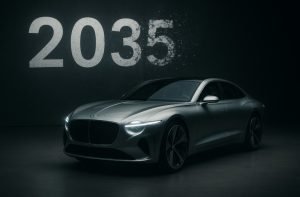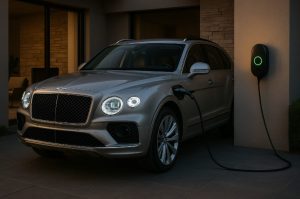
Bentley Electric Vehicle Strategy Shift Marks a Major U-Turn
Bentley, one of the world’s most recognisable luxury carmakers, has once again revised its electrification timeline, marking a significant strategic U-turn.
Once committed to becoming an all-electric brand by 2030, later revised to 2035, Bentley has now abandoned its electric-only sales goal.
This shift highlights the challenges premium automakers face when aligning sustainability goals with customer demand, market readiness, and group-wide strategic decisions.
Why Did Bentley Abandon Its Electric-Only Sales Goal for 2035?

Bentley once presented itself as a pioneer among luxury carmakers by setting a bold target: becoming a fully electric brand by 2030.
That goal was later extended to 2035, reflecting early concerns about the readiness of infrastructure and customer appetite for high-end EVs. Now, the automaker has chosen to abandon the electric-only approach altogether.
Several factors influenced this change. The demand for luxury EVs has not grown at the pace anticipated.
Wealthy customers in core markets remain cautious, preferring the proven reliability of combustion power or the transitional flexibility of hybrids.
CEO Frank-Steffen Walliser pointed out that without sufficient demand, the business case for an all-electric line-up becomes unsustainable.
This strategic decision acknowledges that while environmental targets are crucial, they must also align with customer expectations and real-world market conditions.
For Bentley, the strategy shift is about timing rather than abandoning electrification altogether.
How Did Audi and Porsche Influence Bentley’s Strategy Change?
Bentley’s position within the Volkswagen Group ties its future to the strategies of Audi and Porsche.
The three brands share development platforms, drivetrains, and technological innovations, meaning they cannot easily pursue entirely independent routes.
When Audi and Porsche opted to extend the life of internal combustion engines in certain models, Bentley was left with little choice but to follow. This collaborative development framework is both a strength and a limitation:
- It allows Bentley to benefit from cutting-edge technology at reduced cost
- It restricts flexibility, as all three brands must broadly align on product direction
As Walliser admitted, Bentley’s revised plan reflects not only internal strategy but also the collective approach taken by its sister brands.
The Volkswagen Group’s cautious stance on EV-only transitions has effectively reshaped Bentley’s roadmap.
Which Bentley Models Will Still Feature Gas Engines?

Despite ongoing electrification efforts, petrol power remains central to Bentley’s identity and sales strategy.
Upcoming generations of the Bentayga, Continental, and Flying Spur will all feature internal combustion variants alongside hybrids.
This decision is strongly linked to customer preferences in markets such as:
- North America: where infrastructure for EVs remains inconsistent, and demand for large, powerful petrol cars continues
- Middle East: where petrol-powered luxury remains highly desirable, partly due to fuel affordability and customer tradition
By continuing to provide petrol models, Bentley ensures that it can retain loyal buyers who are not yet convinced by electric powertrains. This balanced approach helps secure sales in regions that are slower to transition towards EVs.
Next-Generation Bentley Line-up
| Model | Planned Powertrains | Target Market Focus |
| Bentayga | Petrol + Plug-in Hybrid | North America, Middle East |
| Continental GT | Petrol + High-performance Hybrid | Global luxury performance |
| Flying Spur | Petrol + Hybrid | Chauffeur-driven markets |
Is Bentley Completely Abandoning Electrification?
The recent U-turn may appear dramatic, but Bentley continues to view electrification as essential to its future.
From 2026 onwards, the company has committed to launching at least one new electrified model each year. This will be a mix of plug-in hybrids and fully electric vehicles.
The first milestone will be the launch of the Urban SUV, a fully electric luxury crossover.
This model will test the waters for Bentley in the high-demand SUV segment, offering customers a zero-emission option without sacrificing comfort or brand prestige.
Beyond this, Bentley’s strategy involves gradually expanding electrification across its range rather than enforcing a sudden transition.
What Role Will Plug-In Hybrids Play in Bentley’s Future?

Plug-in hybrids (PHEVs) are becoming a cornerstone of Bentley’s evolving strategy as the brand seeks to balance environmental commitments with customer expectations.
With the company stepping back from its electric-only pledge, PHEVs offer a middle ground that provides the best of both worlds: the familiar reassurance of petrol engines combined with the efficiency and modernity of electric power.
For Bentley, this technology is more than just a temporary fix. It represents a deliberate bridge between the company’s combustion-dominated past and an electrified future.
By incorporating plug-in hybrids, Bentley can continue to deliver on three critical fronts: performance, luxury, and sustainability.
Why PHEVs Matter for Bentley’s Transition?
- Customer Familiarity: Many of Bentley’s clients are long-standing luxury car buyers who value the refinement and power of traditional engines. PHEVs ease them into electrification without requiring an immediate leap to all-electric vehicles. This ensures that customers do not feel alienated by drastic technological shifts.
- Practicality in Diverse Markets: Charging infrastructure remains inconsistent across the globe. While some regions in Europe and parts of Asia are rapidly expanding EV charging networks, areas such as North America and the Middle East lag behind. PHEVs solve this problem by offering petrol back-up for long journeys, giving drivers confidence in markets where EV charging is limited.
- Performance Enhancement: Unlike earlier perceptions of hybrids as compromises, Bentley is using plug-in systems to amplify performance. Pairing electric motors with powerful combustion engines delivers instant torque and enhanced horsepower, creating vehicles that surpass the capabilities of their petrol-only predecessors.
- Regulatory Compliance: Stricter emissions regulations across Europe and Asia are forcing manufacturers to reduce fleet emissions. PHEVs provide Bentley with a way to meet these targets without entirely abandoning combustion engines. This approach ensures compliance while keeping customers satisfied with familiar driving experiences.
Bentley’s PHEV Line-Up Plans
Bentley has already introduced hybrid versions of models like the Bentayga, but the strategy will accelerate from 2026 onwards with a planned annual rollout of electrified vehicles. Each launch will either be a fully electric model or a new-generation hybrid.
Future highlights include:
- Bentayga Hybrid Expansion: Building on current offerings with extended electric range and improved efficiency.
- Continental GT Supersports Hybrid: Expected to exceed 771 horsepower, demonstrating that hybrids can lead Bentley’s performance portfolio.
- Flying Spur Hybrid: A chauffeur-driven option where electric assistance provides a smoother, quieter drive in urban environments.
Key Advantages of Bentley Plug-In Hybrids
| Benefit Category | Impact on Bentley Customers | Brand Advantage |
| Familiarity | Smooth transition from petrol to EV | Retains loyal buyers during transition |
| Practicality | Combines electric range with petrol | Expands sales in infrastructure-poor markets |
| Performance | Higher power output with torque boost | Reinforces Bentley’s luxury performance image |
| Compliance | Meets emission regulations globally | Keeps Bentley competitive in regulated regions |
Long-Term Vision for PHEVs
Although plug-in hybrids are often viewed as an interim step before full electrification, Bentley’s approach suggests they will remain a central part of the brand’s line-up well into the next decade. For markets slow to adopt EVs, hybrids may continue to dominate sales even beyond 2035.
By treating PHEVs not as a compromise but as a luxury-enhancing technology, Bentley positions itself uniquely in the premium segment.
The role of hybrids will be to sustain Bentley’s identity as a performance-driven, luxury-focused brand while gradually shifting the balance towards electrification.
How Will Performance Hybrids Define Bentley’s Next Chapter?
Performance remains a central theme of Bentley’s strategy. The upcoming Continental GT Speed Supersports hybrid showcases how Bentley intends to merge tradition with innovation.
Equipped with a twin-turbo 4.0-litre V8, an electric motor, and a 25.9 kWh battery pack, it is expected to produce more than 771 horsepower.
This kind of engineering reflects Bentley’s philosophy: electrification should enhance rather than dilute performance.
By positioning hybrids as an upgrade to traditional combustion rather than a compromise, Bentley strengthens its appeal among performance-focused buyers.
Performance Comparison of Bentley Powertrains
| Powertrain Type | Expected Output | Key Strengths |
| Traditional Petrol | 542–650 hp | Proven reliability, long-range power |
| Plug-in Hybrid (PHEV) | 650–771+ hp | Performance boost, efficiency blend |
| Fully Electric | TBC (from 2026) | Zero emissions, instant torque |
What Does Bentley’s Strategy Shift Mean for the UK Luxury Car Market?

The UK luxury car market is an important case study for Bentley’s U-turn. While government policies support rapid electrification, actual adoption has been slower, especially in the ultra-luxury segment.
British buyers still value combustion engines for their familiarity and emotional appeal.
Bentley’s decision ensures that domestic buyers will have a choice of petrol, hybrid, and electric vehicles, aligning with varying levels of consumer readiness.
It also positions Bentley competitively against rivals such as Aston Martin, Rolls-Royce, and McLaren, all of which are facing similar challenges.
In practice, this strategy means:
- Customers will enjoy more powertrain options tailored to their needs
- Bentley can respond flexibly to market changes without alienating core buyers
- The brand maintains a gradual but visible shift towards sustainability
Conclusion
The Bentley electric vehicle strategy shift highlights the complexity of balancing bold sustainability goals with market realities.
Abandoning its electric-only pledge does not mean a retreat from electrification but rather a recalibration of pace.
With hybrids set to dominate its near-term portfolio and annual electrified launches starting in 2026, Bentley is charting a flexible path.
This U-turn demonstrates that even the most prestigious luxury brands must adapt strategies when customer demand, regional markets, and industry partners dictate a slower transition. For Bentley, the future remains electrified, but not exclusively electric.
Frequently Asked Questions
Why did Bentley cancel its electric-only sales goal?
Bentley cancelled its 2035 electric-only plan due to weak demand for luxury EVs and strategic alignment with Audi and Porsche.
When will Bentley release its first electric vehicle?
Bentley plans to launch its first fully electric model, an Urban SUV, in 2026.
Will Bentley still produce petrol cars?
Yes. The next-generation Bentayga, Continental, and Flying Spur will all continue to be offered with petrol engines.
What role will hybrids play in Bentley’s future?
Plug-in hybrids will serve as a transition technology, combining performance with lower emissions until customer demand for full EVs grows.
How powerful will Bentley’s hybrid performance models be?
The upcoming Continental GT Speed Supersports hybrid is expected to exceed 771 horsepower, blending petrol and electric power.
How does Bentley’s decision affect UK buyers?
UK buyers can expect a mix of combustion, hybrid, and electric Bentleys, rather than a full switch to electric models.
Is Bentley still committed to sustainability?
Yes. Bentley remains committed to introducing an electrified model each year from 2026 and progressing towards long-term carbon neutrality.





